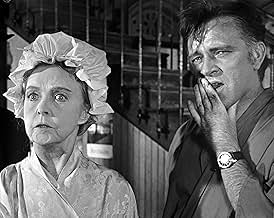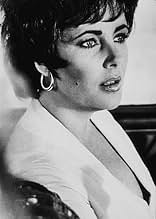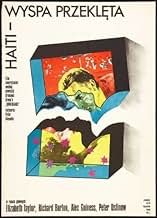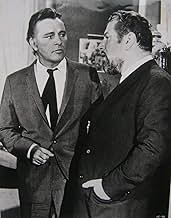CALIFICACIÓN DE IMDb
6.2/10
2.4 k
TU CALIFICACIÓN
Agrega una trama en tu idiomaA cynical Welsh hotel owner secretly romances a diplomat's wife in Haiti, under the violent reign of the despot "Papa Doc" Duvalier.A cynical Welsh hotel owner secretly romances a diplomat's wife in Haiti, under the violent reign of the despot "Papa Doc" Duvalier.A cynical Welsh hotel owner secretly romances a diplomat's wife in Haiti, under the violent reign of the despot "Papa Doc" Duvalier.
- Premios
- 3 premios ganados y 1 nominación en total
Thomas Baptiste
- Haitian Soldier
- (sin créditos)
Make Bray
- Haitian Soldier
- (sin créditos)
Robin Langford
- Angelito Pineda
- (sin créditos)
Dennis Alaba Peters
- César
- (sin créditos)
Opiniones destacadas
When I bought "The Comedians" in DVD, I had never heard before of that movie, although I am a fan of the cinema of the specific era. Moreover, it surprised me I didn't know anything about a film with such an excellent cast: it isn't easy to find Burton, Taylor, Guinness, Ustinov, Gish and Ford in the same movie. And there was something else: it was based on a novel and written for the screen by an author whose work I admire: Graham Greene. Therefore, I was curious to find out why a movie with so many virtues flopped and was so soon forgotten. After watching it, I understood: "The Comedians" is a movie that was made for the general audience, a film that should be fun, fast and easy to digest, a typical Hollywood epic. However, it contains none of the classic ingredients: a) it isn't fun, it is a serious political drama, with a deeply British, cynical and black humour, b) it is not melodramatic enough and the love story between Burton and Taylor evolves quite unorthodoxically, without any clichés, c) it isn't fast at all, it's almost three hours without impressive action scenes and much - quite sophisticated - dialogue, d) it isn't easy to digest, it is a sad and bitter movie with an ambiguous ending. These are the reasons why "The Comedians" flopped, but they are also the reasons that make the film exceptionally interesting. Set in Tahiti during the dictatorship of Francois Duvalier ("Papa Doc"), an ideal location for Graham Greene's stories, it demonstrates the cruelty of the regime, through the story of 6 Westerners and some locals in the background. It is a big, flawless production providing food for thought accompanied by excellent cinematography, professional directing and a slow, but strong and memorable scenario. The claustrophobic atmosphere of the brutal dictatorship is exceptional, the actors give magnificent performances and it is also one of the few films that end without an answer, without a typical happy or tragic ending. I recommend it to viewers that enjoy films that provide more than a pleasant evening.
After delighting audiences in director Franco Zeffirelli's 1967 hit adaptation of Shakespeare's THE TAMING OF THE SHREW, the Burtons' popularity with audiences seemed to be on the wane as their next film, Peter Glenville's THE COMEDIANS (1967) became their first full-fledged box office disappointment. There was much publicity surrounding the political thriller as it shot in Africa (masquerading as Haiti) and the fact that Taylor accepted half her usual salary and took second billing behind Burton kept gossips wagging for months (she reportedly only took the part out of fear of being replaced with Sophia Loren). But when the film opened, critics found it slow and talky and audiences simply seemed uninterested. Although the film is never quite as interesting or as suspenseful as it could have been, I dare say that THE COMEDIANS probably plays a great deal better today without the heavy expectations of the time surrounding it.
Graham Greene does a respectable job of paring down his complex novel for the screen, and director Glenville keeps the film moving at a reasonable pace in spite of its lengthy runtime of 150 minutes. The film is always interesting and occasionally gripping, although Greene and Glenville keep the audience at a relative distance which prevents the picture from striking as hard as it could have. Burton is in good form, and Alec Guinness, Paul Ford, and Lillian Gish all turn in top notch support (only Peter Ustinov feels under utilized). Unfortunately, Taylor is dreadfully miscast as a German military wife complete with a woefully unconvincing accent and her ill-fitting presence creates several lulls in the film as the number of scenes between her character and Burton's character are increased (in order to give the diva her proper screen time) which hampers a few long stretches of the film and slightly undermines what could have been a first-rate effort.
Graham Greene does a respectable job of paring down his complex novel for the screen, and director Glenville keeps the film moving at a reasonable pace in spite of its lengthy runtime of 150 minutes. The film is always interesting and occasionally gripping, although Greene and Glenville keep the audience at a relative distance which prevents the picture from striking as hard as it could have. Burton is in good form, and Alec Guinness, Paul Ford, and Lillian Gish all turn in top notch support (only Peter Ustinov feels under utilized). Unfortunately, Taylor is dreadfully miscast as a German military wife complete with a woefully unconvincing accent and her ill-fitting presence creates several lulls in the film as the number of scenes between her character and Burton's character are increased (in order to give the diva her proper screen time) which hampers a few long stretches of the film and slightly undermines what could have been a first-rate effort.
Based on the novel by Graham Greene, The Comedians is a look at Haiti that nearly 40 years later remains the same - political unrest, poverty, corruption, and brutality. Set during the time of Papa Doc, the story centers on Richard Burton as the white owner of a hotel left to him by his mother. He is in love with the wife (Elizabeth Taylor) of an ambassador (Peter Ustinov) and has managed to remain apolitical. However, events force him to enter the fray.
The Comedians holds one's interest, although it's on the long side. The cast is remarkable: Burton, Alec Guinness, Peter Ustinov, Taylor, James Earl Jones, Lillian Gish, Georg Stanford Brown, Roscoe Lee Brown, and, in a small role, Cicely Tyson. Taylor is very beautiful, although her accent is all over the place. She sounds French in the beginning, then English, then like Elizabeth Taylor, and then in the middle of the movie, we find out she's German.
Though Burton went the schlock for cash route in his career, he was a wonderful, handsome actor with a remarkable voice. Towards the end of the film, he has a scene with Guinness that is well worth the wait - two great actors in a subdued and remarkable scene.
The Haitian scenery belies what lies underneath. It's a film that is perhaps more timely today than it was in 1967.
The Comedians holds one's interest, although it's on the long side. The cast is remarkable: Burton, Alec Guinness, Peter Ustinov, Taylor, James Earl Jones, Lillian Gish, Georg Stanford Brown, Roscoe Lee Brown, and, in a small role, Cicely Tyson. Taylor is very beautiful, although her accent is all over the place. She sounds French in the beginning, then English, then like Elizabeth Taylor, and then in the middle of the movie, we find out she's German.
Though Burton went the schlock for cash route in his career, he was a wonderful, handsome actor with a remarkable voice. Towards the end of the film, he has a scene with Guinness that is well worth the wait - two great actors in a subdued and remarkable scene.
The Haitian scenery belies what lies underneath. It's a film that is perhaps more timely today than it was in 1967.
Peter Glenville's "The Comedians" is a very difficult film for the average viewer. Based on a Graham Greene novel, it's about the political atmosphere in Haiti while under French rule. It was a box office flop in 1967 and is pretty much forgotten today.
That's sad, because this is an important film. Since the departure of Duvalier, the film has the added historical value it didn't have in 1967. It is another entry in the canon of Taylor-Burton collaborations. It also may be the only film in which Alec Guinness, Peter Ustinov, Elizabeth Taylor and Richard Burton all appear in together. Plus, how can you trash a film that flaunts its' Haiti exteriors so joyfully?
The vast Panavision photography will be lost on TV screens, especially in the horrific pan and scan format. The best way to see this film is on a big screen and even that may be impossible these days. The title will confuse many (most will think it's about comedians in a comedy club), but it does have a hidden subtext: these people are "comedians" in a sense. They kid each other endlessly to avoid reality. In that context, "The Comedians" succeeds. It could benefit from some trimming, but that's a small complaint. I can't think of anyone else who would even attempt to make such a challenging film in such a chaotic climate.
***1/2 out of 4 stars
That's sad, because this is an important film. Since the departure of Duvalier, the film has the added historical value it didn't have in 1967. It is another entry in the canon of Taylor-Burton collaborations. It also may be the only film in which Alec Guinness, Peter Ustinov, Elizabeth Taylor and Richard Burton all appear in together. Plus, how can you trash a film that flaunts its' Haiti exteriors so joyfully?
The vast Panavision photography will be lost on TV screens, especially in the horrific pan and scan format. The best way to see this film is on a big screen and even that may be impossible these days. The title will confuse many (most will think it's about comedians in a comedy club), but it does have a hidden subtext: these people are "comedians" in a sense. They kid each other endlessly to avoid reality. In that context, "The Comedians" succeeds. It could benefit from some trimming, but that's a small complaint. I can't think of anyone else who would even attempt to make such a challenging film in such a chaotic climate.
***1/2 out of 4 stars
I haven't read Graham Greene's novel on which this movie is based. But, "The Comedians" on film is laboriously long and drawn out. Except for the first-rate cast of big cinema names of the time, it wouldn't have held my interest all the way through. The fact that the setting is Haiti during the reign of one of the worst despots of the 20th century, François (Papa Doc) Duvalier, only adds to one's uneasiness in watching this movie.
The great storyteller that he was, Graham Greene must have woven the elements of this story together very well in his novel. But here we have two big separate stories butting heads with one another. The first is the adulterous love affair between the two leads, Richard Burton as Brown and Elizabeth Taylor as Martha. The second is the plight of the people of Haiti living in a constant state of terror under the ruthless Duvalier and his henchmen. But then, two other elements that Greene no doubt worked into his single story, here appear to be separate stories awkwardly sandwiched into the two main stories. They are the businesses of Major Jones, played by Alec Guinness, and of Smith, played by Paul Ford. The end result is a plot with many subplots – all poorly connected.
Besides the leads, the film has several stellar actors. Guinness and Ford are joined by Peter Ustinov as Ambassador Pineda, Lillian Gish as Mrs. Smith, and James Earl Jones as Dr. Magiot. A handful of others in the supporting cast also give good performances in the film.
The direction and editing are weak. The cinematography is good and the location does a good job showing the scenery and conditions as they might have been in Haiti from the late 1950s through most of the 20th century. But for that historical connection and the performances of the supporting cast, this film is hardly worth watching. At the end of the movie, it seemed to me that I had been watching a belabored story about a sex-driven but frustrated white hotel owner in Haiti who couldn't find fulfillment in anything he did.
Movie fans who enjoy history may find Duvalier's story interesting. He was a physician who treated the poor and suffering people of Haiti in his early life. That's where he got his endearing moniker from the people, "Papa Doc." He was elected president in a free open election in 1957. But he soon became crazed with power. He killed 30,000 of his countrymen and established a reign of fear and terror, while the poor of his country suffered all the more.
The great storyteller that he was, Graham Greene must have woven the elements of this story together very well in his novel. But here we have two big separate stories butting heads with one another. The first is the adulterous love affair between the two leads, Richard Burton as Brown and Elizabeth Taylor as Martha. The second is the plight of the people of Haiti living in a constant state of terror under the ruthless Duvalier and his henchmen. But then, two other elements that Greene no doubt worked into his single story, here appear to be separate stories awkwardly sandwiched into the two main stories. They are the businesses of Major Jones, played by Alec Guinness, and of Smith, played by Paul Ford. The end result is a plot with many subplots – all poorly connected.
Besides the leads, the film has several stellar actors. Guinness and Ford are joined by Peter Ustinov as Ambassador Pineda, Lillian Gish as Mrs. Smith, and James Earl Jones as Dr. Magiot. A handful of others in the supporting cast also give good performances in the film.
The direction and editing are weak. The cinematography is good and the location does a good job showing the scenery and conditions as they might have been in Haiti from the late 1950s through most of the 20th century. But for that historical connection and the performances of the supporting cast, this film is hardly worth watching. At the end of the movie, it seemed to me that I had been watching a belabored story about a sex-driven but frustrated white hotel owner in Haiti who couldn't find fulfillment in anything he did.
Movie fans who enjoy history may find Duvalier's story interesting. He was a physician who treated the poor and suffering people of Haiti in his early life. That's where he got his endearing moniker from the people, "Papa Doc." He was elected president in a free open election in 1957. But he soon became crazed with power. He killed 30,000 of his countrymen and established a reign of fear and terror, while the poor of his country suffered all the more.
¿Sabías que…?
- TriviaSeveral critics noted that the ending of this movie is at least a little more positive and optimistic than the bleak ending of Graham Greene's original novel, and attacked the movie for "softening" the subject. Graham Greene, however, insisted that the more upbeat ending had been his own idea.
- ErroresIn the last few shots in the movie, as the Character is leaving the airport, there is initially a departing Vickers VC10 airliner flying overhead from right to left, this changes to a close up, followed by a shot of the same airliner now flying into the distance - unfortunately this is different 4 engine Jetliner, probably a Boeing 707.
- Citas
Brown: I don't believe in causes.
Dr. Magiot: The role of cynic doesn't really suit you, Brown.
Brown: I don't believe in play-acting either.
Dr. Magiot: You imagine because you've lost one faith, you've lost all? You're wrong, Brown. There is always an alternative to the faith we lose.
Brown: I have no faith in faith.
- ConexionesFeatured in The Comedians in Africa (1967)
Selecciones populares
Inicia sesión para calificar y agrega a la lista de videos para obtener recomendaciones personalizadas
- How long is The Comedians?Con tecnología de Alexa
Detalles
- Fecha de lanzamiento
- Países de origen
- Idiomas
- También se conoce como
- The Comedians
- Locaciones de filmación
- Productoras
- Ver más créditos de la compañía en IMDbPro
Taquilla
- Total en EE. UU. y Canadá
- USD 5,200,000
- Tiempo de ejecución2 horas 30 minutos
- Mezcla de sonido
- Relación de aspecto
- 2.35 : 1
Contribuir a esta página
Sugiere una edición o agrega el contenido que falta

Principales brechas de datos
By what name was Los Farsantes (1967) officially released in India in English?
Responda


































